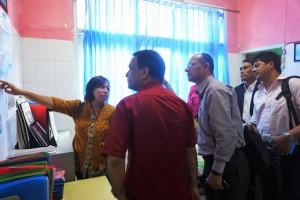
In early March 2016, a high-level delegation from Nepal’s Ministry of Health family planning division and United States Agency for International Development (USAID) visited Indonesia. The tour aimed to showcase Indonesia’s successful advocacy and social and behavior change communication approaches, which could be relevant to the Nepali context.
“We were, in a matter of days, able to get a breadth of understanding of the national family planning programs in Indonesia,” said Pranab Rajbhandari, Nepal’s Health Communication Capacity Collaborative Deputy Chief of Party. “We observed the implementation, coordination, and collaboration at the local level, which is crucial to getting the family planning agenda on the district radar.”
Organized by Indonesia’s National Population and Family Planning Board (BKKBN), with assistance from the t Johns Hopkins Center for Communication Programs Indonesia and Yayasan Cipta Cara Padu, the delegation spent a day in East Lombok, a district in West Nusa Tenggara. East Lombok has achieved family planning budget advocacy wins through the Improving Contraceptive Method Mix (ICMM) project. ICMM is a four-year operations research project investigating the impact of targeted advocacy activities on increasing the use of long-acting and permanent methods (LAPM) in the East Java and West Nusa Tenggara provinces. It uses Advance Family Planning’s advocacy approach.
Due to Indonesia’s decentralization and devolution of government authority, many budgeting and programmatic decisions for health are made by decision-makers in more than 500 districts and municipalities. Nepal has a similarly decentralized government.
The delegation met with local government authorities and partners who showed how decentralized family planning advocacy programs are being financed and implemented through partnerships at the subnational level.
Mr. Rajbhandari noted that field visits to the Puskesmas Terara health clinic to see how family planning services are provided, “were very enriching and eye opening.” The representatives from Nepal and Indonesia discussed the role of the health provider – including the Puskesmas counseling process, post-partum family planning, and family planning mobile outreach services to the community.
They continued the discussion at a meeting with the Nusa Tenggara Barat Provincial Working Group and the Lombok Timur District Working Group. The two working groups are learning to navigate advocacy during the decentralized government era.
Meeting with the delegation from Nepal provided an opportunity for exchanging ideas and reflections on:
- developing the working groups and realizing their roles,
- improving method mix and choice,
- increasing the local budget for family planning,
- implementing advocacy tools,
- improving the district supply chain of contraceptives,
- involving the private sector,
- and reaching more religious communities.
The ICMM project began in October 2012 and is funded by USAID and the Australian Department of Foreign Affairs and Trade, with additional support from the Bill & Melinda Gates Foundation through Advance Family Planning. ICMM is led by CCP, in collaboration with Yayasan Cipta Cara Padu for advocacy implementation and The Center for Health Research, Universitas Indonesia for research implementation.

